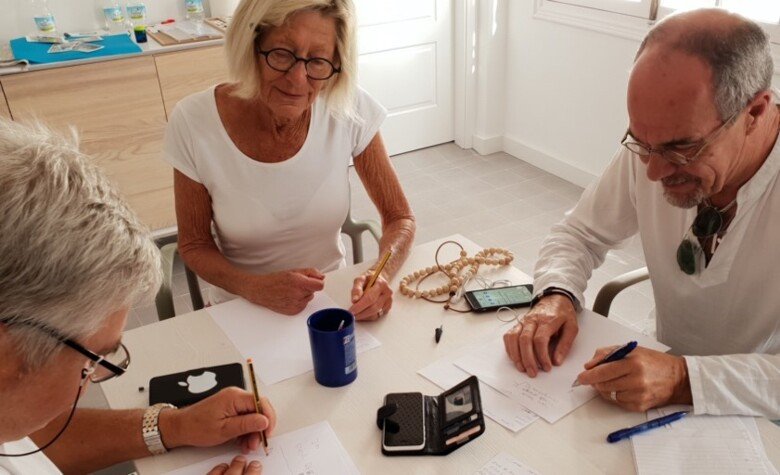Multimodal intensive rehabilitation of aphasia and apraxia of speech after stroke
The MIRAA-study (Multimodal Intensive Rehabilitation of Aphasia and Apraxia of speech) aims to study the national implementation of a new treatment model for acquired impairment of language (aphasia) and speech (apraxia of speech) following stroke.
Multimodal intensive rehabilitation of aphasia and apraxia of speech after stroke

The MIRAA-study (Multimodal Intensive Rehabilitation of Aphasia and Apraxia of speech) aims to study the national implementation of a new treatment model for acquired impairment of language (aphasia) and speech (apraxia of speech) following stroke.
Communication difficulties have negative impact on quality of life
Every year, approximately 26,000 people suffer from stroke in Sweden, which makes stroke a national disease. About half of those affected by stroke have communication difficulties, these difficulties are in many cases long-lasting or permanent. Language and speech impairment after a stroke is a serious condition with large negative impact on the individual's quality of life in the form of reduced communicative participation and activity.
The brain is plastic
Over the past decade, neurologic research has shown that the adult and aging brain is plastic, and that language and speech improvements can occur many years after an injury with intensive rehabilitation.
Limited access to intensive rehabilitation of speech and language
There are large geographical variations in access to rehabilitation of speech and language after stroke in Sweden and a shortage of speech language pathologists (SLPs) in outpatient care has been noted. SLPs report that they have difficulty following the National Board of Health and Welfare's new guidelines for stroke care (2018), which advocate intensive rehabilitation of aphasia.
Promoting introduction of intensive rehabilitation
The primary purpose of the study is to identify hindering and facilitating factors in the implementation of intensive speech and language rehabilitation after stroke in Swedish healthcare. The secondary purpose is to investigate short-term and / or long-term effects on language, speech, communication and quality of life after intensive rehabilitation according to the MIRAA programme and investigate possible correlations between treatment outcome and age, gender, fatigue, motivation, type and degree of impairment.
Intensive rehabilitation for six weeks
SLPs across the country have been invited to participate in the study and will recruit patients from their caseload. The participants with speech / language disorders receive speech-language pathology rehabilitation with evidence-based methods for a period of six weeks. Participating SLPs undergo further training in intensive speech-language pathology rehabilitation.
Participants are randomized to a control group that start with an initial waiting period, or an intervention group that receives 60 hours of rehab for 6 weeks according to a multimodal model that includes proposals for training individually, in groups and with a computer. The goal is to include approximately 70 participants over a time period of two years. Data is collected through questionnaires to SLPs and researchers, semi-structured interviews with researchers and SLPs as well as field observation and focus group interviews made by the doctoral student in the project. Data collection also includes testing with standardized instruments assessing language, speech, communication, cognition and quality of life. Test data is collected before and after intensive training with follow-up after four months.
A - Intervention, 6 weeks - None or less intensive rehabilitation, 16 (+-2) weeks
B - Waiting period, 6 weeks (control) - Intervention, 6 weeks - None or less intensive rehabilitation, 16 (+-2) weeks
Clinics all over the country participate
The following clinics participate in the study:
- Aleris Rehab Station, Stockholm; Dalen
- Capio Rehab, Stockholm
- Farsta logopedmottagning, SLSO, Stockholm
- Fysrehab, Lidköping
- Logopedmottagningen Helsingborg och Ängelholm
- Logopedienheten, Södra Älvsborgs sjukhus, Borås
- Logopedkliniken, Danderyds sjukhus, Stockholm
- Logopedbyrån Dynamica AB, Stockholm, Gustavsberg och Södertälje Neurologimottagningen, Skånes universitetssjukhus, Lund
- Neurorehab, Vrinnevisjukhuset, Norrköping
- Närhälsan Gamlestadstorgets rehab, Göteborg
- Närhälsan Gibraltar rehabmottagning, Göteborg
- Närhälsan Angered, Rehabmottagning, Göteborg
- Rehabiliteringscentrum, region Jönköping
- Rehabenheten, Sjukhusen i väster, Göteborg och Kungälv
- VO Neurologi, Skånes universitetssjukhus, Lund
- Sävedalen rehabmottagning, Partille
- Vällingby logopedmottagning, SLSO Västra, Stockholm
- Specialistrehabiliteringsenheten, Uppsala
- Rehabenheten, Kliniken för medicin och geriatrik, Karlskoga
Contact
If you want more information about the study or want to participate, please contact
Marika Schütz marika.schutz@ki.se and Ellika Schalling ellika.schalling@ki.se
Selected references
Babbitt, E. M., Worrall, L. E., & Cherney, L. R. (2015). Structure, processes, and retrospective outcomes from an intensive comprehensive aphasia program. American Journal of Speech-Language Pathology, 24(4), S854–S863.
Breitenstein, C., Grewe, T., Flöel, .… et al. (2017). Intensive speech and language therapy in patients with chronic aphasia after stroke: a randomised, open-label, blinded-endpoint, controlled trial in a health-care setting. The Lancet, 389(10078), 1528–1538.
Palmquist, E., (2018) Svenska logopeders omhändertagande av personer med afasi och deras närstående (Swedish speech language pathologist’s care of people with aphasia and their relatives), Degree project, Uppsala: Uppsala University.
Pierce, J. E, Menahemi-Falkov, M., O’Halloran, R., Togher, L., & Rose, M. L. (2019). Constraint and multimodal approaches to therapy for chronic aphasia: A systematic review and meta-analysis. Neuropsychological Rehabilitation, 29(7), 1005–1041.
Pulvermüller, Friedemann, & Berthier, Marcelo L. (2011). Neuroscience insights improve neurorehabilitation of poststroke aphasia. Nature Reviews Neurology, 7(2), 86–97.
Socialstyrelsen (Swedish National Board of Health and Welfare). Nationella riktlinjer för vård vid stroke. (National guidelines for stroke care) (2018) Stockholm: Socialstyrelsen
